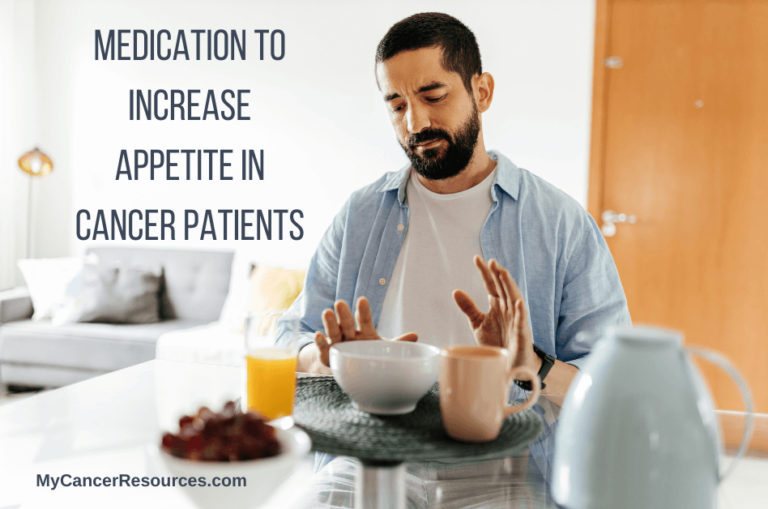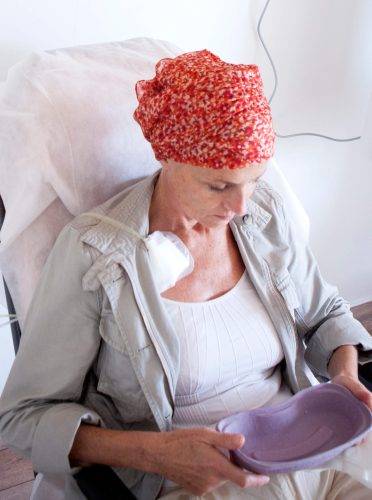
Cancer treatments can decrease hunger, which not only impacts weight, but overall health and recovery. Weight loss and muscle loss, also called cachexia, are serious complications that come from a lack of eating. This means it can take longer to heal, and having lower levels of strength and energy can decrease your quality of life. Thankfully, there is medication to increase appetite in cancer patients. There are also things you can do at home that may help improve your appetite.
It’s also important to understand how cancer can lead to a lack of appetite. This way you and your caregiver can make sure you’re getting necessary nutrients, even when you don’t feel like eating.
Common Causes of Decreased Appetite
What is it about cancer treatment that makes you lose your appetite?
Certain types of cancer are more likely to make you lose your appetite. Both the physical and emotional side effects of the disease and its treatment are also common culprits.
Some cancers can block your digestive system as tumors grow. This can be a symptom of advanced cancer, including ovarian cancer, stomach, pancreatic or bowel cancer. Tumors that press against the stomach can lead to feeling full very easily. This is called early satiety. You feel full, so you stop eating, but in reality, you haven’t eaten enough to get proper nutrients or maintain your body weight.
Other cancers, including head and neck cancers can make it difficult to swallow, which leads to eating and drinking less, to avoid that discomfort and pain.
Common side effects of treatment can also decrease the appetite. Radiation therapy to the gastrointestinal tract commonly leads to a desire to eat less food.
Fatigue can make it tough to even have the energy to make something to eat, let alone eat it.
Chemotherapy can also lead to a dry mouth or mouth sores, making it harder to eat. Having a metallic taste in the mouth dramatically changes the way food tastes. It makes sense that if something tastes bad, you’ll want to eat less. but that can lead to a lower caloric intake and unintentional weight loss.
Nausea and vomiting are unfortunately common side effects to cancer treatment, and both lead to wanting to eat less.
Stress and other responses to having cancer, including anxiety and depression can also lead to a lack of appetite. These are perfectly normal and understandable responses, but when combined with thee other reasons for decreased appetite can lead to severe weight loss.
Knowing that there is a potential risk for decreased appetite because of certain types of cancer or its treatment can help you and family members plan ahead and take steps to make sure you don’t lose too much weight from not eating.
Tips for Dealing with a Poor Appetite
The following tips may help to make sure you’re getting adequate nutrition, even with a low appetite:
- Eat smaller meals and eat more often, like every few hours rather than three large meals per day. It’s often easier to eat a variety of nutrient-rich, small portions throughout the day.
- Prioritize protein and calorie-rich snacks, such as cheese, nuts, yogurt, peanut butter and avocado to supplement meals. These small but powerful bites can deliver the energy your body needs to cope with treatment.
- Drink smoothies and protein shakes. These options are especially helpful if solid food isn’t appealing or if you have a dry mouth. Add in fruits, vegetables, protein powders, and even ice cream to provide your body with essential nutrients.
- Drink your liquids between meals, so you don’t feel too full at mealtime.
- Adjust recipes as needed – switching up herbs and spices can help combat a metallic taste.
- Physical activity can also stimulate hunger, so engage in light exercise such as a short walk to boost energy and trigger feelings of hunger.
- Finally, work with a registered dietitian to make sure you’re drinking plenty of fluids and getting balanced nutrition to support your health during cancer treatment.
Medication Options to Increase Appetite
The following are appetite stimulants that may be recommended if you’re struggling to eat or maintain weight:
Megestrol acetate: You may be prescribed this synthetic hormone to improve appetite and promote weight gain. There can be some serious side effects like blood clots with this medicine, which is known as Megace, so your health care team will monitor you closely if you take this.
Steroids: Medications like dexamethasone can both increase energy and stimulate the appetite while also possibly improving nausea.
Cannabinoids: If you’re experiencing poor appetite, medical marijuana or dronabinol, the active ingredient in cannabis, may be options. They can aid appetite and weight gain. You’ll need to discuss this option with with your healthcare team, as medical marijuana remains illegal in some states.
Working With Your Healthcare Team
It’s important to work with your medical team to create a plan to address appetite changes. This includes your oncologist, a dietician, and a palliative care specialist.
Open communication can help them fully understand what you’re experiencing and come up with non-medical and medical approaches to help your energy level and an increased appetite. They will also consider any other medical conditions you have and determine the best way to approach appetite stimulation and weight gain.
Using a food tracker like the one provided for free in the Resource Library may be helpful to record the types and amounts of foods and liquids you’re consuming.
There may be patterns that you discover that can help your treatment team in determine the different medicines and approaches that may be needed to improve your appetite.
Complementary Therapies to Maintain or Improve Appetite
Some studies have been conducted to test if certain complementary therapies can help to maintain or even improve appetite and reduce weight loss in people with cancer.
These have included nutritional supplements of essential fatty acids or acupuncture. Studies like these have had small sample size and so additional studies are needed to make sure these approaches are effective for larger groups of people.
Your palliative care team can help recommend complementary approaches to try.
Aromatherapy, which is the use of essential oils to address certain issues and improve quality of life may also be helpful to stimulate appetite.
Essential oils including tangerine. spearmint, bergamot and peppermint may help increase appetite.
Diffusing one or a blend of these oils into the air prior to mealtime may increase a desire to eat.
If you are suffering from nausea, diffuse ginger essential oil, or mix a few drops of the essential oil into a tablespoon of fractionated coconut oil and then rub that oil on your abdomen prior to eating.
Supporting Loved Ones with Cancer Cachexia
Watching a loved one struggle with loss of appetite and significant weight loss from cancer can be heart-wrenching.
As a caregiver, you might feel helpless, but remember, your support can be incredibly comforting. Focus on offering emotional support and creating a positive environment.
Explore nutritional options like protein-enriched smoothies or snacks high in calories that can sometimes make a significant difference.
Also, engage in light activities with them to possibly stimulate their appetite.
Making mealtimes a social event may also help. The longer your loved one stays at the table while having lighthearted conversation may encourage them to eat more.
You may want to connect with support groups where you can learn from others who have been down the same road. They can provide insight and suggest creative ways to manage these challenges.
A Balanced Approach to Improving Appetite
Your cancer journey involves balancing medical treatments with lifestyle changes and choices to maintain your strength and well-being. A crucial part of that balance is managing your appetite during this challenging time.
There is no best way or one way to deal with a decreased appetite and the weight loss that comes from it. It’s important to understand the role of nutrition in maintaining energy and avoiding unintended weight loss.
There are different strategies you can try to encourage healthy eating habits and get proper nutrition during treatment and beyond.
Talk to your healthcare team for personalized dietary advice, and consider eating more small meals throughout the day instead of fewer large ones. This approach helps prevent feelings of fullness that can lead to skipped meals.
Try enhancing flavors with herbs and spices to make your favorite foods more appetizing, and choose room temperature dishes if hot foods worsen nausea or irritate mouth sores.
Calories and nutrients are vital, so include energy-dense foods such as peanut butter, avocados, or cheese to enrich your meals.
Even with these tactics, you may still experience low appetite. If this happens, your doctor may prescribe medication to increase appetite and increase your food intake, leading to increased body weight.
Remember, the goal is not just weight gain but rather nurturing your body with the proper nutrients needed for recovery and an improved quality of life.
Exercise, when possible and recommended by a healthcare professional, helps boost appetite and energy levels.
Blending these nutritional tips and medicatioin when needed, you give your body the nutrients it needs to help your recovery from cancer treatment.



